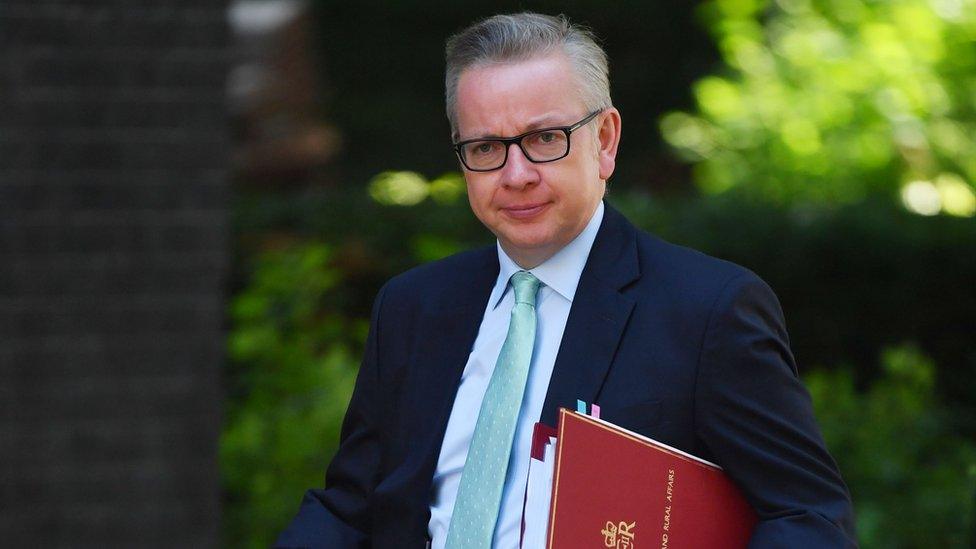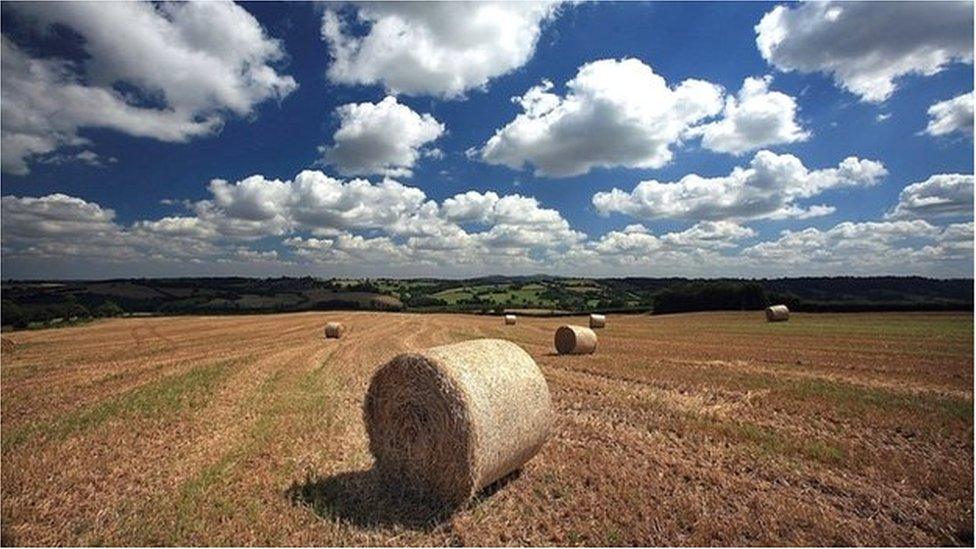Farm subsidies 'must be earned' - Michael Gove
- Published

Mr Gove says leaving the EU will allow Britiain to reform how it cares for the environment
Farm subsidies will have to be earned rather than just handed out in future, the Environment Secretary Michael Gove has said in a speech.
Farmers will only get payouts if they agree to protect the environment and enhance rural life, he will say.
The move is part of what he calls his vision for a "green Brexit".
Farmers’ leaders want the current £3bn total to be spent on the environment, more infrastructure to develop farm businesses, and promoting British food.
The government has promised to keep overall payments at the same level until 2022.
The Tenant Farmers' Association - which represents tenant farmers in England and Wales - has called for the same amount of money to remain after that time.
Under the EU's current Common Agricultural Policy (CAP), farmers are paid based on the amount of land they farm.
However, in a speech at WWF's Living Planet Centre in Woking on Friday, Mr Gove said the current system will be abolished after the UK has left the EU.
He criticised the current system for giving money to some of the UK's wealthiest landowners, for encouraging wastage, and for not recognising "good environmental practice".
Mr Gove described Brexit as "a once-in-a-lifetime opportunity to reform how we care for our land, our rivers and our seas, how we recast our ambition for our country’s environment, and the planet".
Loss of wildlife
Critics say under the CAP wealthy UK landowners are given subsidies of up to £3m a year.
The issue was highlighted last year when BBC News revealed that taxpayers are paying more than £400,000 a year to subsidise a farm where a billionaire Saudi prince breeds racehorses.
The Newmarket farm of Khalid Abdullah al Saud - owner of the legendary horse Frankel - is among the top recipients of farm grants, along with the Queen.
Environmentalists will applaud the promise of change; they blame the CAP for the huge loss of wildlife in the British countryside.
The question for Mr Gove will be what detailed policy takes its place.

The Environment Secretary says that CAP puts resources in the hands of the already wealthy
Mr Gove said in his speech: “There are very good reasons why we should provide support for agriculture. Seventy per cent of our land is farmed - beautiful landscape has not happened by accident but has been actively managed.
“Agriculture is an industry more susceptible to outside shocks and unpredictable events - whether it’s the weather or disease. So financial assistance and mechanisms which can smooth out the vicissitudes farmers face make sense."
He also expressed a desire to protect the “human ecology” of Britain’s highlands, where farming without subsidy is impossible.
This won’t please radical environmentalists, who want Mr Gove to save money (and in their view enhance the environment) by letting sheep farming wither, and allowing the uplands to revert to natural forest.
The Country Land and Business Association, known as the CLA, accepts the need for reform and has launched a plan for a land management contract.
Ross Murray, president of the CLA - which represents owners of land, property and businesses in England and Wales - said there is "vital work to be done", including to support farming practices, to manage soils and preserve land.
When pressed on whether rich landowners should received public money, he told BBC Radio 4's Today programme he was open to change but practices such as tree planting - which are good for the environment but provide landowners with little benefit - should still be recognised.
Asked if farming subsidies could be reduced in the future, he added: "In the long term perhaps, but in the meantime I think we're going to have to support farmers who provide public goods which could never be provided by the market."
Craig Bennett, head of Friends of the Earth, welcomed the speech, but said: “Current EU rules aimed at tackling air pollution and climate change and protecting our birds, bees and nature must not be watered down, and mechanisms must be put in place to enforce them post-Brexit."
National Farmers' Union (NFU) president Meurig Raymond said that, after leaving the EU, "it is important that we see a broad and innovative range of measures to ensure farmers continue to deliver all the benefits - for our wellbeing, for our economy and for our environment - that the country enjoys".
He added: "Such a policy needs to be comprehensive, providing support to farmers not just for environmental work, but also to manage risk and volatility, and to improve productivity and resilience among farming businesses."
One crucial question will be who has the final say on proposed developments in the UK's prime wildlife sites. At the moment they are protected by the EU as part of Europe's common heritage. That protection may disappear after Brexit.
Follow Roger on Twitter., external